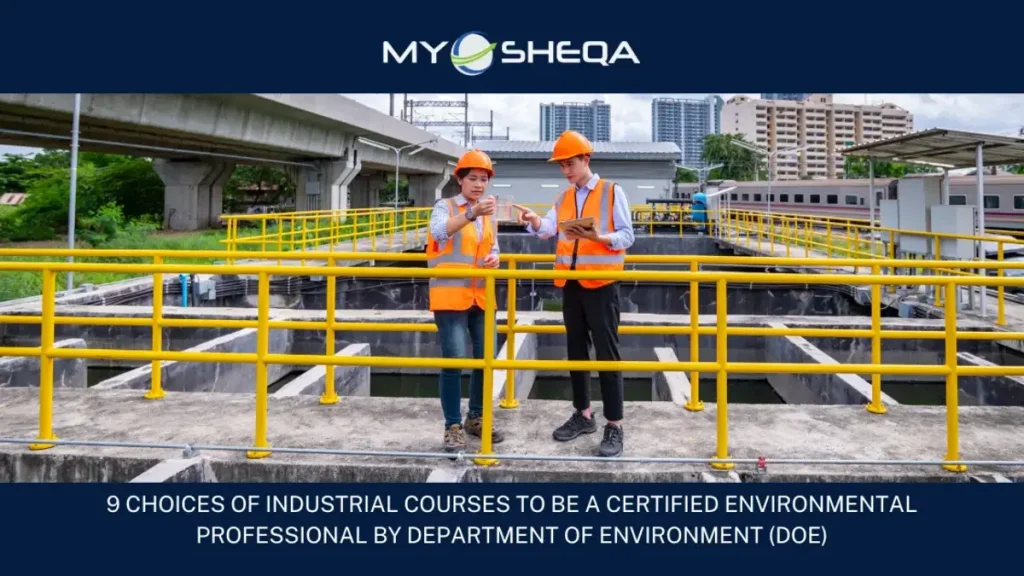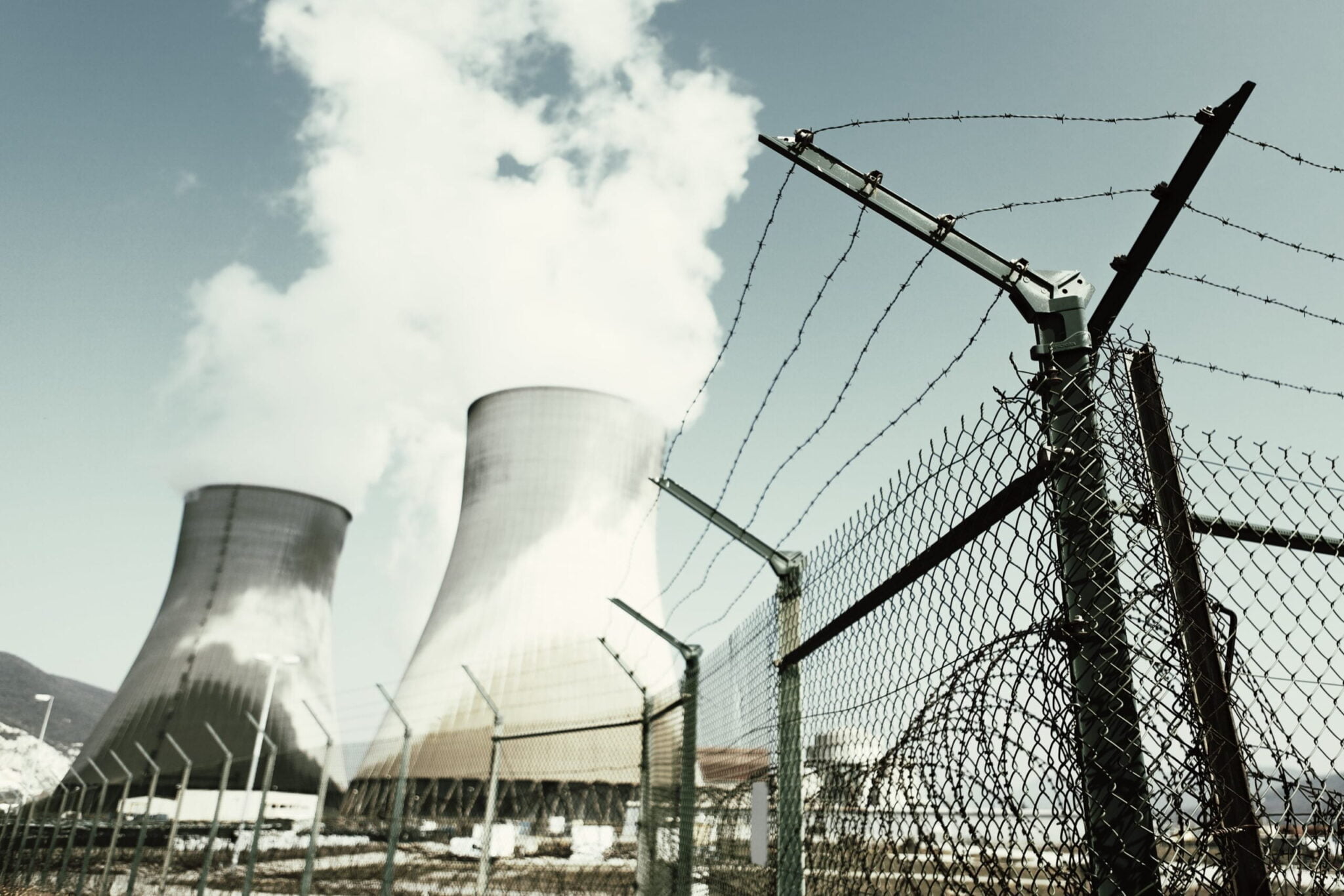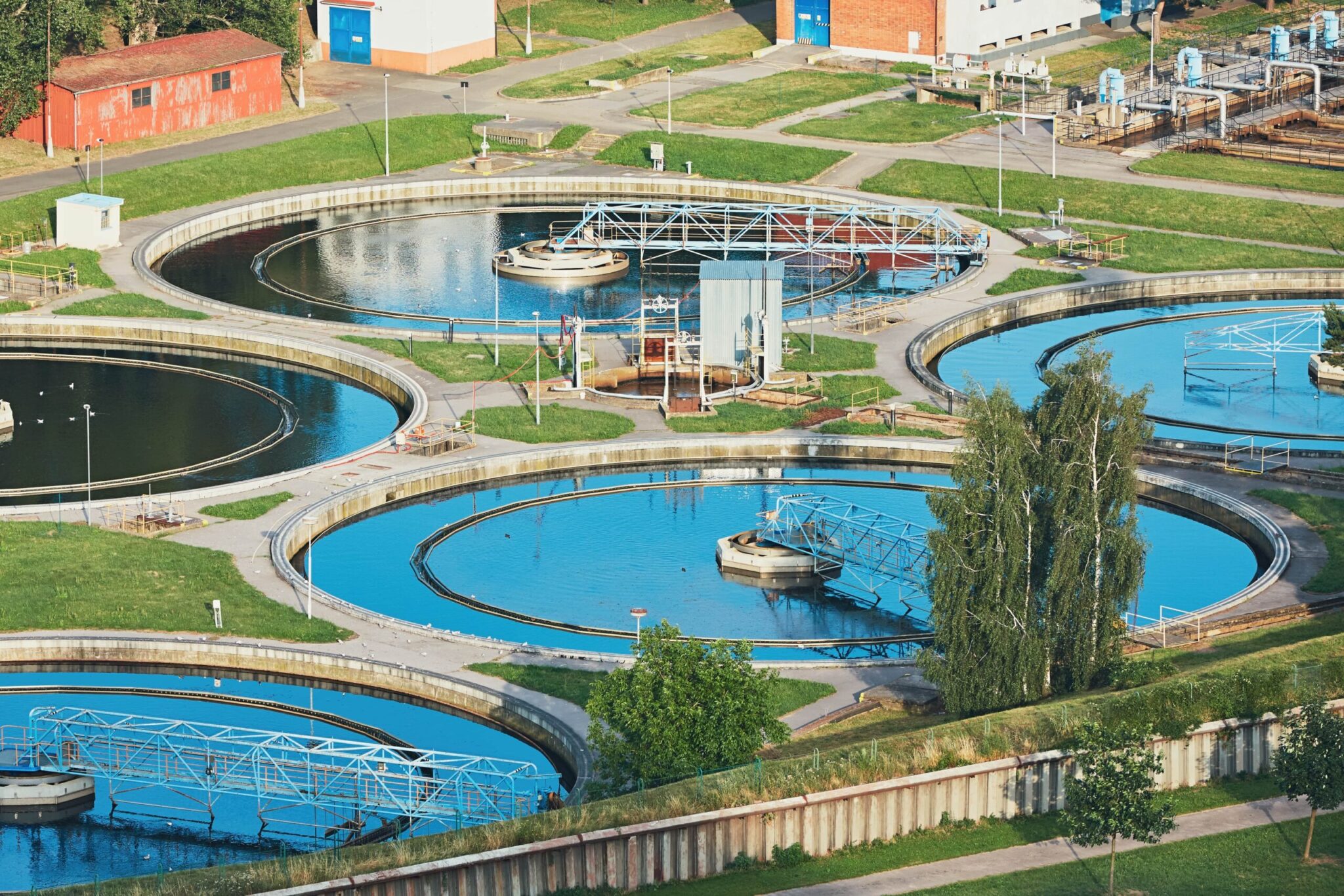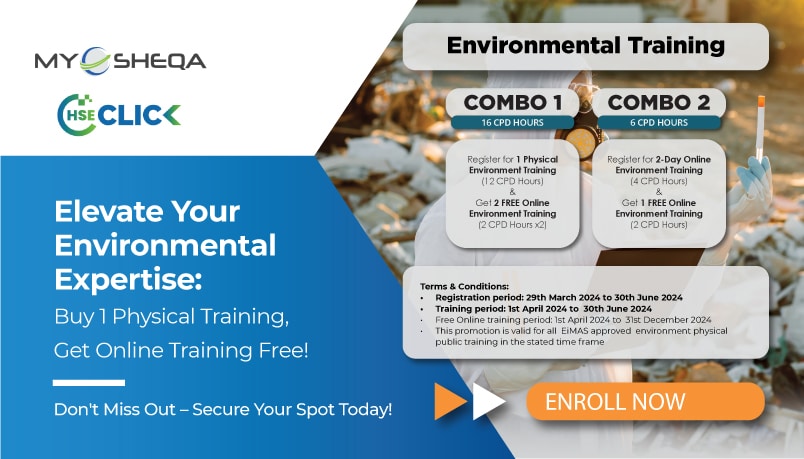
Environmental, Occupational Health and Hygiene Professionals have been listed as one of the critical occupations based on CRITICAL OCCUPATIONS LIST 2020/2021 TECHNICAL REPORT.
Occupations are considered critical if they are skilled, sought-after, and strategic. This Critical Occupations List (COL) report has stated that Environmental and Occupational Health and Hygiene Professionals is one of the demanded occupations that are associated with Malaysia’s growing knowledge-based economy.
This is the right time for you to grab the chances to be the competent environmental officer.
BUT
In order for you to be certified by DOE, there are 9 different Industrial Courses that offered by Environmental Institute of Malaysia (EiMAS) can be chosen to attend to by individual who wished to be the demanded competent environmental officer.
EiMAS is a training institute under the Department of Environment Malaysia located within the UKM Bangi campus. The establishment of EiMAS is an important development for the Department of Environment (DOE) given the need to enhance the knowledge and skills of public and private employees to address environmental management issues.
In this article, we will share with you the 9 Choices of Industrial Courses to Be A Certified Environmental Professional by Department of Environment (DOE). According to EiMAS, a competent person/ certified environmental professional is a person who has been certified by the Director General of the DOE to be competent to supervise the operation of a pollution control system or the management of scheduled wastes. The individual needs to go through the certification process and comply with all the requirements before he/she can be certified.
There are 9 choices of Industrial courses altogether that you can be chose to attend to in order to be certified by DOE.
Should you keen to be in this field, you need to have the knowledge on these things
- Basic tools, equipment, methods, safe work practices in the operation and routine maintenance of the mechanical and basic electrical components of the pollution control system.
- Typical unit operations and unit processes utilized for the treatment system.
- Typical causes of the pollution control system noncompliance problems.
You also expected to have the (hands on) skills in:
- Reading and interpreting meters, gauges, and other recording devices and in adjusting controls in the operation of the pollution control system.
- Conducting performance monitoring activities which involve sampling, in situ measurements and basic process control laboratory tests.
- Performing corrective actions to address common pollution control upset situations.
Should you have the above knowledge and skills, you may consider yourself suitable to be in this field. Now, we will share with you the 9 choices of Industrial Courses you need to attend to be certified by DOE.
Table of Contents

1. Course for Certified Environmental Professional in The Operation of Industrial Effluent Treatment Systems (Biological Processes – Activated Sludge Process) CePIETSO (BP)
The success of the operation of an IETS is primarily in the hands of the operator. A knowledgeable and skilled operator or supervisor knows how to monitor the processes occurring in his IETS, understands what factors affect the IETS performance, knows what operational conditions are best for his IETS and how to maintain them, knows how to respond to upset conditions, understands the social obligations and legal implications for noncompliance.
Successful operation of an IETS is an integral part of the operation of a successful industry. A trained and skilled IETS operator or supervisor is not anymore, a luxury but rather a must-have to the industry. Good environmental performance not only portray positive corporate image but avoid possibility of factory downtime and hefty monetary penalties due to legal actions from the environmental authority.
The industries must pay great attention to the training of their staff in the proper operation and maintenance of the IETS. EiMAS is providing a training program to train your IETS operators and supervisor to be competent in operating IETS particularly in conducting performance monitoring of the IETS components.
The competent operator or supervisor will be able to ensure that the IETS is operating optimally.
This unique training course which focuses on hands-on approach is in fact the only one of its kind in Malaysia. A Certificate of Competency will be awarded to participants who successfully completes the course, passes the examination, and submits a field training report.
1.1 CePIETSO (BP) Requirements:
- Candidate must possess a Bachelor’s degree or higher in Science or Engineering; or
- Diploma in Science or Engineering with 1 year experience in IETS operation or supervision.
1.2 CePIETSO (BP) Course Methodology:
- Lectures / Discussion
- Course Assignment
- Practical Training at EiMAS’ IETS Training Center
- Hands on Lab Sessions
1.3 Who should attend CePIETSO (BP):
- Responsible person to be in charge of the operation of an IETS at their work premise; Supervisors of IETS.
1.4 Objective of CePIETSO (BP):
- To impart knowledge to the IETS operators and supervisors on the importance of performance monitoring.
- To develop skill on the conduct of IETS performance monitoring and evaluation of performance monitoring data.

2. Course for Certified Environmental Professional in the Operation of Industrial Effluent Treatment Systems (Physical Chemical Processes) CePIETSO (PCP)
The success of the operation of an IETS is primarily in the hands of the operator. A knowledgeable and skilled operator or supervisor knows how to monitor the processes occurring in his IETS, understands what factors affect the IETS performance, knows what operational conditions are best for his IETS and how to maintain them, knows how to respond to upset conditions, understands the social obligations and legal implications for noncompliance.
Successful operation of an IETS is an integral part of the operation of a successful industry. A trained and skilled IETS operator or supervisor is not anymore, a luxury but rather a must-have to the industry.
Good environmental performance not only portray positive corporate image but avoid possibility of factory downtime and hefty monetary penalties due to legal actions from the environmental authority. The industries must pay great attention to the training of their staff in the proper operation and maintenance of the IETS. EiMAS is providing a training program to train your IETS operators and supervisor to be competent in operating IETS particularly in conducting performance monitoring of the IETS components.
The competent operator or supervisor will ensure that the IETS is operating optimally.
This unique training course which focuses on hands-on approach is in fact the only one of its kind in Malaysia. A Certificate of Competency will be awarded to participants who successfully completes the course, passes the examination, and submits a field training report.
2.1 CePIETSO (PCP) Requirements:
- Candidate must possess a Bachelor’s degree or higher in Science or Engineering; or
- Diploma in Science or Engineering with 1 year experience in IETS operation or supervision.
2.2 Who should attend CePIETSO (PCP):
- Responsible person to be in charge of the operation of an IETS at their work premise; Supervisors of IETS.
2.3 CePIETSO (PCP) Course Methodology:
- Lectures / Discussion
- Course Assignment
- Practical Training at EiMAS’ IETS Training Center
- Hands on Lab Sessions
2.4 Objectives of CePIETSO (PCP):
- To impart knowledge to the IETS operators and supervisors on the importance of performance monitoring.
- To develop skill on the conduct of IETS performance monitoring and evaluation of performance monitoring data.

3. Certified Environmental Professional in Bag Filter Operation (CePBFO)
In order to assure continuous compliance with the emission standards, air pollution control systems need to be properly operated. Proper operation and maintenance are also a requirement under Regulation 40 of the Clean Air Regulations, 1978. The key factor that ensures successful operation of bag filters is having a trained operator in charge of the operation and maintenance of the bag filters.
The DOE is also in the process of regulating the competency of personnel qualified to maintain and operate control equipment as provided under section 51(1)(w) of the Environmental Quality Act 1974. Thus, there is a need for operators of bag filters and supervisors to become competent persons who are certified by the DOE.
Responsibility on performance monitoring and preventive maintenance of bag filters should be entrusted only to a skilled and trained operator. DOE is providing a training program to train your operators and supervisors to be competent in operating bag filters. The emission from bag filters which are properly operated and maintained will always be in compliance with the emission standards.
Regulatory compliance means avoiding any embarrassment from unexpected enforcement action arising from non-compliance. Therefore, enroll your operators into this unique one of its kind certifications programs in Malaysia which focuses on hands-on approach. A Certificate of Competency will be awarded to participants who successfully completes the course, passes the examination, and submits a field training report.
3.1 CePBFO Requirements:
- Candidate must possess a: Diploma or Degree in Science or Engineering; or
- Certificates from polytechnic or SKM with level 2 with 1 year experience; or
- SPM with 3 – 5 years’ experience.
3.2 Who should attend CePBFO:
- Industry personnel who have been given the task to operate or supervise the operation of bag filters on industrial premises.
3.3 CePBFO Course Methodology:
- Lectures / Discussion
- Course Assignment
- Hands on training using industry size bag filters at our Training Providers’ Hands on Air Pollution Control Training Centre
3.4 Objectives of CePBFO:
- To give hands-on training to the participants on how to conduct performance monitoring of bag filters.
- To develop skills of participants to properly operate bag filters to ensure compliance with the Clean Air Regulation, 1978.

4. Course on Certified Environmental Professional in Scrubber Operation (CePSO)
One of the main air pollution control systems widely used in the industries in Malaysia for the control of gaseous pollutants is scrubbers. To ensure proper operation and continued optimal performance, scrubbers need to be operated or supervised by competent persons.
The Environment Institute of Malaysia (EiMAS) has introduced a hands-on training program to certify your operators and supervisors as competent persons to supervise the operation of scrubbers.
Through this certification program, your operators and supervisors will be trained to conduct performance monitoring as outlined in the Guidance Document on Performance Monitoring issued by the Department of Environment (DOE).
4.1 CePSO Requirements:
- Candidate must possess a: Diploma or Degree in Science or Engineering; or
- Certificates from polytechnic or SKM with level 2 with 1 year experience; or
- SPM with 3 – 5 years’ experience.
4.2 Who should attend CePSO:
- Industry personnel who have been given the task to operate or supervise the operation of scrubbers on industrial premises.
4.3 CePSO Course Methodology:
- Lectures / Discussion
- Course Assignment
- Hands on training using industry size scrubber installed at EiMAS Hands on Air Pollution Control Training Centre.
4.4 Objectives of CePSO:
- To impart knowledge and skills to enable operators and supervisors to properly operate scrubbers to ensure compliance with the Clean Air Regulation, 1978 and to help prevent episodes of scrubber failure.
- To give hands-on training on how to conduct performance monitoring of scrubbers.

5. Course for Certified Environmental Professional in Sewage Treatment Plant Operation – CePSTPO
There are thousands of sources of sewage discharge in Malaysia ranging from simple ISTs serving a few PEs to large complex ASTSs serving several thousand PEs. The quality of treated sewage effluent discharged from these STSs depends greatly on the operation and maintenance of the systems. In order to ensure continuous regulatory compliance, serious attention must be given to the knowledge and skills of the operators and supervisors who have been tasked to operate, maintain, and monitor the performance of the systems.
The CePSTPO program implemented by EiMAS focuses on the operational aspects of the STS operation. The program incorporates training drills to develop understanding and skills in several areas, including environmental regulations and fundamental concepts of sewage treatment, sewage engineering laboratory, STS performance monitoring, statistical data analysis using computer software, technical report writing, and technical presentation.
The graduates of the CePSTPO program are well grilled STS professionals who understand DOE’s regulatory requirements and possess knowledge and skills in STS processes and performance monitoring, hence are able to optimally operate the STS. Having a CeSPTPO graduate in your organization not only makes your company comply with the legal requirement on Competent Person but is also a valuable asset that will ensure STS regulatory compliance on a continuous basis.
5.1 CePSTPO Requirements:
- Candidate must possess a: Bachelor’s degree or higher in Science or Engineering; or
- Diploma in Science or Engineering with 1 year experience in STS operation or supervision.
5.2 Who should attend CePSTPO:
- Industry staff responsible for environmental compliance of the Sewage Regulations 2009. STS operators and supervisors; Industry personnel responsible for STS operation in industrial premises; Technical staff of STS service providers providing services to clients (such as rest areas and commercial establishments); Technical staff charge of STS operation in hotels, resorts, supermarkets, etc.; Environmental compliance officers.
5.3 CePSTPO Course Methodology:
- Lectures / Discussion
- Course Assignment
- Hands on STS Eng. Lab
- Field Training Report Assessment
5.4 Objectives of CePSTPO:
- To produce STS professionals who possess technical knowledge and skills on STS performance monitoring and are also conversant with the environmental regulations governing the STS operation.

6. Course On Certified Environmental Professional in Scheduled Waste Management (CePSWaM)
Scheduled wastes are by nature very toxic and dangerous. Improper management of such wastes will lead to serious pollution of the environment and the ecosystem as well as immediate /long term impacts to human health.
Managing scheduled wastes requires a comprehensive understanding of regulatory framework, waste properties, waste management concepts, and accepted good management practices. EiMAS is providing a training program to train your personnel who are involved in managing scheduled waste to be competent in their job function.
The competent person will ensure that scheduled waste on your premise is managed properly in accordance with the legal requirements. This unique training course which focuses on hands-on approach is in fact the only one of its kind in Malaysia. A Certificate of Competency will be awarded to participants who successfully complete the course, passes the examination, and submits a field training report.
6.1 CePSWaM Requirements:
- Candidate must possess a: Diploma or Degree in Science or Engineering; or
- Diploma or Degree in other discipline with 1 year experience; or
- Certificates from polytechnic or SKM with level 3; or
- SPM with 3 years’ experience handling scheduled waste. Please attach a letter from the company to confirm the working experience in handling scheduled waste.
6.2 Who should attend CePSWaM:
- Managers / supervisors who are involved in managing toxic and hazardous waste (scheduled waste) at industrial facilities.
6.3 CePSWaM Course Methodology:
- Lectures / Discussion
- Course Assignment
- Hands on training session on identification, labeling and storage
6.4 Objectives of CePSWaM:
- Explain the legal requirements on scheduled waste management.
- Identify, classify and categorize scheduled waste.
- Implement sound and effective scheduled waste management practices.
- Formulate an implementation plan for full compliance with the regulatory and requirements of the Environmental Quality (Scheduled Wastes Regulations) 2005.

7. Course on Certified Environmental Professionals In The Leachate Treatment Plant Operation (CePLTPO)
This unique training course which integrates both the “minds-on” and “hands-on” aspects is in fact the only one of its kind in Malaysia. A Certificate of Competency will be awarded to participants who successfully complete the course, pass the examination and submit a field training report (FTR) and passes the professional interview.
7.1 CePLTPO Requirements:
- Candidate must possess a:
- Bachelor’s degree or higher in Science or Engineering; or
- Diploma in Science or Engineering with 1 year experience in LTS operation or supervision.
7.2 Who should attend CePLTPO:
- Industry staff responsible for environmental compliance with the Environmental Quality (Control of Pollution from Solid Waste Transfer Station and Landfill) Regulation 2009.
- Supervisors and operators of LTS.
7.3 CePLTPO Course Methodology:
- Lectures / Discussion
- Course Assignment
- Hands on LTS Eng. Lab and LTS pilot plant practical Sessions
- Field Training Report Assessment
7.4 Objectives of CePLTPO:
- To impart understanding of the Environmental Quality (Control of Pollution from Solid Waste Transfer Station and Landfill) Regulation 2009.
- To impart knowledge and develop skills on the conduct of LTS performance monitoring and evaluation of performance monitoring data.
- To produce landfill personnel who possess both technical competence in LTS operation and thorough understanding of regulatory requirements.

8. Course for Certified Environmental Professional in the Treatment of Palm Oil Mill Effluent (CePPOME)
Regulatory control over discharges from crude palm oil industry is instituted through Environmental Quality (Prescribed Premises) (Crude Palm Oil) Regulations, 1977 promulgated under the Environmental Quality Act, 1974 and enforced by the Department of Environmental (DOE). The main instrument of Pollution control is the imposition of licensing system and relevant effluent discharge standards for both land application and water course discharges.
Palm oil mill effluent (POME) is essentially a colloidal suspension – basically a mixture of sterilizer condensate, separator sludge and hydro – cyclone wastewater. Raw POME has a high organic biochemical oxygen demand (BOD) and if not properly treated could pose as a high organic pollutant. Notwithstanding of the several limitations of conventional lagoon – based effluent treatments systems such as generating large amounts of sludge and take up large land areas, they have been traditionally used for the treatment of POME.
The systems are attractive due to their simplicity with relatively low operating costs, high in-situ solids storage capabilities and low operator attention requirements. Where land is available and the topography is suitable, lagoon-based systems have been the preferred secondary treatment process steps to reduce the biological and chemical constituents of POME as mainly represented by the parameters – biological oxygen demand (BOD), chemical oxygen demand (COD) and total suspended solids (TSS). New treatment technologies have had been developed to provide cost-effective treatment technologies for palm oil effluent with the approach ranging from zero waste generation to resource recovery.
The main purpose of the training course is to introduce the participants with the concept and practice of performance monitoring as a means to monitor and control effluent treatment process efficiency and to ensure that the treatment system is operating optimally and in compliance with the environmental regulations.
8.1 CePPOME Requirements:
- Candidate must possess a:
- Bachelor’s degree or higher in Science or Engineering; or
- Diploma in Science or Engineering with 1 year experience in POMETS operation or supervision.
8.2 Who should attend CePPOME:
-
Industry personnel who are in charge of supervising the operation of Palm Oil Mills Effluent Treatment Systems (POMETS).
8.3 CePPOME Course Methodology:
- Lectures / Discussion
- Course Assignment
- Hands on Lab Sessions
- Field Training Session
8.4 Objectives of CePPOME:
- To impart knowledge to the POMETS supervisors on the importance of performance monitoring of POMETS.
- To develop skill on the conduct of POMETS performance monitoring and evaluation of performance monitoring data.

9. Certified Professional Environmental Officer in Eia Project Development (CePEOEIA)
Environmental Officer (EO) will be the key contact person in EIA project development, responsible for environmental matters and resolving environmental issues during land disturbing activities implementation. Competence in the field of erosion and sedimentation control is crucial to ensure the only qualified person are given the role of managing the aspects of environmental management effectively.
9.1 CePEOEIA Requirements:
- Candidate must possess a:
- Degree in Environmental Management/ Science / engineering or other related to the environment; or
- Diploma in environmental management/ science/ engineering with minimum 3 years of working experience; or CPESC/CISEC/CESSWI Certification.
9.2 Who should attend CePEOEIA:
- Environmental Officers (EO), who are responsible for supervising an EIA project development and compliance to the conditions of approval for the EIA Report.
9.3 CePEOEIA Course Methodology:
- Lectures / Discussion
- Case Studies
- Class will be conducted in both English and Bahasa Malaysia
- Examination will be in English
9.4 Objectives of CePEOEIA:
- Understanding Legal Framework.
- Understanding of Conditions of Approval EIA Reports (COA).
- Fundamental Roles of Stakeholders.
- LDP2M2 and Best Management Practices (BMPs).
- Environmental Sustainability Report & Transparency Initiatives.
Sounds interesting, isn’t it? Are you ready to jump into this field? Choose any industrial courses that you’re keen to, then be the demanded person in this field! 😊
As now Environmental officer is highly on demand in Malaysia market, this should be the right time for you to grab this golden opportunity.
Further Reading:








